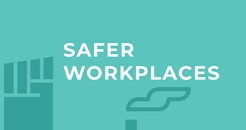 How companies can support survivors of domestic abuse
How companies can support survivors of domestic abuse
From an article by Business Fights Poverty
A few years ago, companies wouldn’t want to talk about domestic violence and abuse. What’s changed, and why are companies increasingly looking at this issue? Broadly:
-
Companies have more awareness of the workplace impacts of domestic violence and abuse, which increased dramatically during COVID-19. We know that as many as 90% of survivors report that the harm caused by domestic violence affected their participation in and productivity at work.
-
Companies are also seeing the links between domestic abuse and their broader equity goals, such as closing the gender pay gap and supporting diversity, inclusion and women’s leadership.
-
In feminised workplaces like the garment sector, there has been a lot of inspiring work done by trade unions and others to urge companies to adopt policies.
-
An increasing number of governments are adopting legislation and implementing positive duties on employers to mitigate the effects of domestic violence and abuse at work.
The telecoms sector has been at the forefront of this action. Vodafone has led the way with its global policy and linking the prevention of domestic violence and abuse with its core business, for example, through Bright Sky and other apps against abuse.
Others like Anglo American have viewed the issue as one of risk – and in the mining sector, there is a lot of danger and risk – so they have seen this issue as part of their core business and have ensured that HR and security staff are trained to undertake domestic violence risk assessment.
Companies like Unilever have a global policy and have looked at this issue through the lens of safeguarding and occupational health and safety.
The financial and banking sector has been doing inspiring work in recognising that their customers may also need support, particularly around financial abuse. ABSA in South Africa is the first African bank to have proactively supported its staff.
And then there is brand leverage – the excellent example of Avon selling beauty products to women through their network of associates who are provided with information that they can pass on to somebody who’s experiencing domestic abuse.
It’s about using what you have as a business and seeing the links.
Some companies want to understand better how domestic violence and abuse affect their organisation – this may involve employee surveys, consulting with survivors, employees and managers, and gathering evidence to make the business case to senior management.
If the company isn’t quite ready to adopt a full policy, it should look at existing systems and policies to see where domestic violence can be aligned with human resources procedures or security or risk assessment processes.
For companies ready to go further, develop a policy and train staff across global markets on how to implement the policy effectively. This is where companies can have real leverage to address domestic violence and abuse in multiple locations. This work often involves providing practical tools and guidance, communicating and responding effectively when somebody is at risk, carrying out a domestic violence risk assessment, and also how to hold perpetrators accountable.
In future, we need to focus more on prevention and integrate all forms of gender-based violence into occupational safety and health and risk assessment. The other critical area to work on is to ensure that we ALL have a role to play by building allies inside and outside the workplace and impacting our families and communities. If more people talk about and have an understanding of domestic violence and abuse, it might make it easier for us to have conversations with our friends and relatives who might be experiencing domestic violence and abuse. It will also enable us to have conversations with our children about building healthy, respectful relationships in an era of digital abuse.
Read the full article and access a toolkit and domestic violence policy template.
Retweet about this article:
From an article by Business Fights Poverty, 05/06/2024